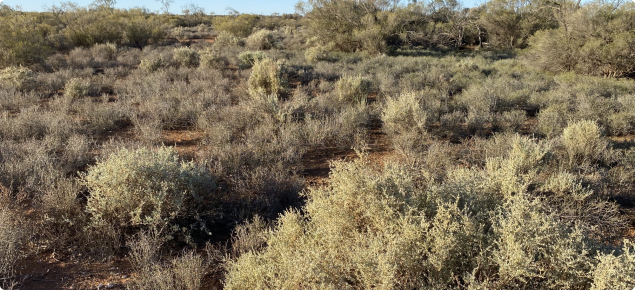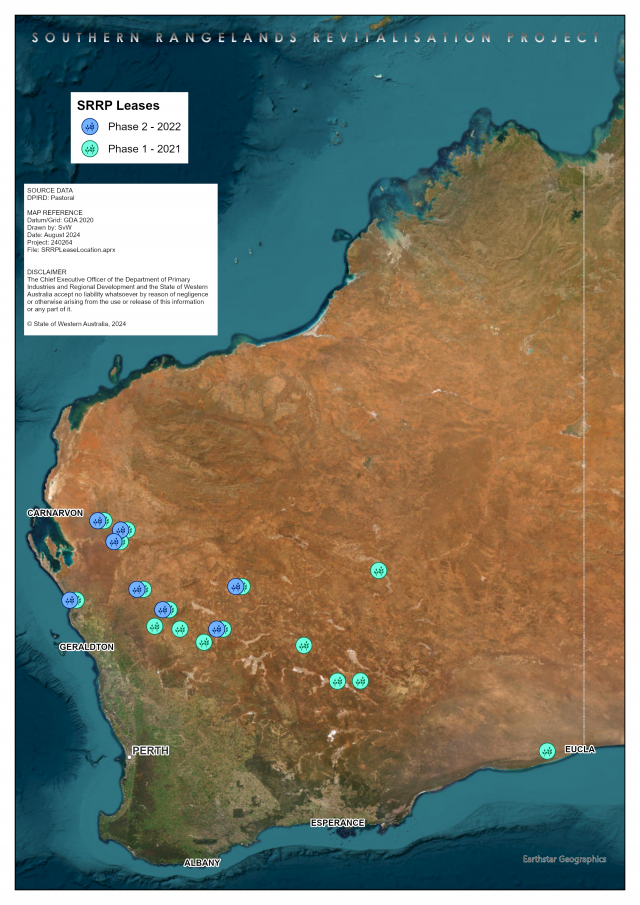Applications now closed - phase 3, Stage 1 grants |
This program is a systems approach to rangelands revitalisation incorporating:
- the regeneration of palatable, productive, perennial vegetation
- landscape function and hydration restoration
- total grazing pressure control, and
- livestock management.
The program provides support to pastoralists to learn as a community through organised group meetings with likeminded pastoralists, funding to access expertise and training, and grant funding for revitalisation projects.
Program phases
The program is being delivered in 3 phases. All 16 stations from Phase 1 were invited to apply for funding and progress into Phase 2.
- Phase 3, stage 1 - applications closed
- Phase 2 Pilot - in progress
- Phase 1 Pilot - complete
Phase 3 (July 2024 – June 2027)
The third phase of the Southern Rangelands Revitalisation program, funded by the WA State Government’s Climate Adaptation Strategy, is for new pastoral stations joining the program. The program continues to focus on the objective to improve rangeland condition and land productivity, which overtime, will lead to improved livestock profitability.
Up to $105,000* funding is available to pastoral lease holders, delivered in two stages, to maximise the development of effective and achievable on-station revitalisation projects.
*cash and in-kind co-contributions required
Phase 3 will widen its focus to be more inclusive to pastoral leases held or managed by traditional owners, and to biosecurity pressures managed through total grazing pressure control. An AgTech grant package of $5,000 is another new program feature on offer to support project measurement and monitoring.
The program will have 3 grant rounds opening for new participants at 6-monthly intervals. Each round will have 3 streams of funding available:
- Open - All Southern Rangelands pastoral lease holders
- Aboriginal held or operated pastoral leases
- Biosecurity – Projects focused on total grazing pressure control
Regular meetings with the other participants continue as an important feature of the program. The meetings provide the opportunity to draw on the experience and knowledge of other pastoralists in addition to the training courses, specialist speakers, and support in developing revitalisation projects.
Phase 3 recipients
| Station | Region |
|---|---|
| Gnaraloo | Gascoyne |
| Lake Way & Millbillillie | Goldfields |
| Pindabunna | Murchison |
| Windidda | Goldfields |
| Yoweragabbie | Murchison |
| Brickhouse | Gascoyne |
| Mount Jackson, Kawana & Lake Barlee | Goldfields |
| Meeberrie | Murchison |
| Austin Downs | Murchison |
| Towrana & Gilroyd | Murchison & Gascoyne |
Regional research demonstration sites
Phase 3 will also feature the establishment of regional research demonstration sites to explore constraints to the adoption of technologies and practices for revitalisation. This will be driven by pastoralists and supported by deeper science and inquiry. Site hosts will be an important part and will be the first to benefit from trials. Contact us to find out more about being a site host.
Phase 2 (June 2022 - December 2024)
The second phase, funded by the Australian Government’s Future Drought Fund – Resilient Soils and Landscape program and the WA State Government’s Climate Resilience Fund, is supporting a selection of pastoralists from Phase 1 to implement on-ground station revitalisation projects.
Grants were awarded for pastoralists to undertake projects to demonstrate how drought resilience in the southern rangelands of WA can be improved through the restoration of the natural capital and implementation of practices aimed to protect the resource base and increase livestock profitability. They are also supported with further training opportunities during project implementation and organised group meetings.
All 16 stations from Phase 1 were invited to apply for funding and progress into Phase 2. Eight projects were successful at a total value of $775,741. The successful applicants clearly explained how their project activities would result in regeneration of the rangelands.
SRRP-DR Phase 2 Grant recipients
| Station | Region | Grant | Project |
|---|---|---|---|
| Challa Station | Murchison | $146,880 | A network of trap yards to manage cattle in a regenerative grazing system, alongside earth works and native seed spreading to improve perennial vegetation and rehabilitate degraded areas. A portable biodiversity monitor to track changes in vegetation cover, soil health, wildlife and livestock. A field day and herd health testing to help optimise herd profitability. |
| Wooleen | Murchison | $88,364 | Implement an ecological rest-based grazing system to rotate cattle, supported by a centralised tank, pipelines and water points, and irrigated grass nurseries to re-introduce plants at free water points. |
| Murchison House | Murchison | $150,000 | Land recovery to improve revegetation and ground cover by total grazing pressure control, with exclusion fencing and a mustering race/linear trap yard, equipped with remote gates, monitoring, and additional water points to control goats on their natural migration paths into the Second Gully catchment. |
| Dairy Creek | Gascoyne | $79,009 | Implement rotational grazing with trap yards and remote water monitoring to control total grazing pressure, support regeneration of perennials and improve cattle management through drought in the entire northern section of the station. |
| Carey Downs | Gascoyne | $93,760 | Introduce rangelands self-herding strategies with paddock fencing, trap yards and lick feeders to rotationally graze cattle, alongside earthworks to rehydrate and rehabilitate degraded areas. |
| Hillview | Murchison | $32,541 | Erosion repair through hessian bag bunds to slow and trap water flow, soil and seed to improve ground cover and revegetate. Fenced exclusion cells to support native vegetation seed nurseries. |
| Jimba Jimba | Gascoyne | $143,184 | Introduce rest based rotational grazing, manage stocking rates through fencing and water-point trap yards. Erosion control works to slow and re-direct water movement across the landscape and support plant establishment. |
| Melangata | Murchison | $41,943 | Fencing a de-stocked paddock with 8-line stocksafe and solar powered electric wire with camera monitoring sites installed along the fence. The paddock will become part of a rest based grazing system starting with the removal of grazing and predation animals for landscape recovery before the reintroduction of sheep. |
Each station has multiple project sites and demonstration activities. Six general types of revitalisation solutions are being tested by the Phase 2 participants:
- Rest based rotational grazing to control grazing pressure
- Native seed nurseries and exclosure cells to assist revegetation and natural spread
- Landscape rehydration (mechanical and minimal soil disturbance) to slow rainfall runoff, trap soil and seed and improve rainfall infiltration
- Technology to assess natural capital e.g. portable biodiversity monitor
- Trapyard and watering point projects to improve the management of livestock and other grazers
- Increase and improve fenced paddocks to control grazing pressure and implement rest based rotational grazing
These solutions are being applied in different ways by the pastoralists to suit their landscapes, challenges and management priorities.
Phase 1 (March 2021 - December 2022)
The initial 12-month pilot phase funded by the WA State Government focused on investigating solutions and planning including:
- funded attendance to relevant training courses
- supported access to relevant professional expertise and coaching
- facilitated pastoralist group to fine-tune solutions for each station.
Sixteen stations were supported by DPIRD to attend training and access to professional expertise. They were also supported to engage regularly as a group to draw on the experience and knowledge of other participants, work together on common issues, assess and provide feedback on solutions – equipping them with the knowledge and skills to piece things together themselves.
Phase 1 - station participants
| Murchison | Edah Murchison House Hillview Gabyon Challa Station Kirkalocka Melangata Wooleen |
|---|---|
| Goldfields | Menangina Prenti Downs Sturt Meadows Edjudina |
| Nullarbor | Mundrabilla |
| Gascoyne | Jimba Jimba Dairy Creek Carey Downs |
Revitalisation need and potential: Program beginnings
A DPIRD-led industry workshop in June 2021, brought together 40 representatives with an interest in rangelands revitalisation. At the forefront of the event were discussions on what was needed to support the revitalisation of the southern rangelands.
Knowledge was shared about the importance of revitalising the southern rangelands and attending pastoralists expressed their desire of a viable, profitable, and thriving livestock industry. They also highlighted the importance of the region becoming economically and biologically sustainable through improving landscape and balancing profit and productivity with revitalisation.
The workshop participants shared the factors they considered as the basics of improving range condition and long-term profitability.
| Technical aspects | Personal aspects |
|---|---|
|
|
Contacts
For program queries, please email Southernrangelands@dpird.wa.gov.au.
- Project Lead – Kari-Lee Falconer
- Project Development Officer – Fiona Brayshaw
- Rangelands Scientist – Nathan Penny



